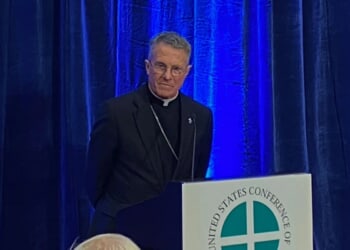In a policy pivot as consequential as it is symbolic, Germany is now offering cash for departure instead of promises of sanctuary. And across Europe, the asylum era that once defined a continent’s conscience is being quietly, systematically dismantled.
Germany’s latest move on migration may lack the theater of fences or flashpoints, but its implications run deeper. In November 2025, Berlin confirmed it would offer financial incentives to roughly 2,000 Afghan nationals stranded in Pakistan — many previously approved for relocation — if they voluntarily abandoned their resettlement claims. The offer includes several thousand euros, paid in stages, under a “voluntary return assistance” program. Interior Minister Alexander Dobrindt was blunt: “If we assume that people have no possibility of being admitted to Germany, we offer them some perspective, and this is linked to making a financial offer for a voluntary return.” (RELATED: Trump’s Cash-for-Departure Plan: A New Approach to Immigration?)
The nation that once cast itself as the moral anchor of the 2015 refugee crisis is now underwriting exits.
This is more than bureaucratic housekeeping. It is an ideological correction. The nation that once cast itself as the moral anchor of the 2015 refugee crisis is now underwriting exits. The gesture is pragmatic, even humane, but unmistakably transactional. And Germany is hardly alone.
In Sweden, the government introduced a tiered program in March 2025, offering up to €5,000 to asylum seekers who agree to leave without appealing their rejection. Those who delay receive less. Those forcibly deported, just €1,000. In Finland, a similar system offers €5,300 to those who depart within 30 days of rejection, dropping to €2,000 thereafter. (RELATED: The Scandinavian Lesson: What Malmö Warns Us About America’s Sanctuary Cities)
Denmark — the continent’s most unapologetic skeptic of open migration — offers as much as €27,000 to Syrians who opt to return home. Uptake has been limited, but Danish officials insist it is cheaper, fairer, and more sustainable than endless accommodation.
Austria, meanwhile, responded to the fall of the Assad regime in late 2024 by launching a review of Syrian asylum cases. By mid-2025, it had initiated more than 8,000 revocation proceedings, offering €1,000 in return support to those who choose to go voluntarily.
Even the Netherlands has joined the rethink. In September 2025, it signed a letter of intent with Uganda to open a “return hub” for rejected asylum seekers who cannot yet be repatriated to their home countries, a logistical halfway house between deportation and limbo.
These are not anomalies but coordinates in a broader pattern. In March 2025, the European Commission proposed legal authorization for “return hubs” outside the EU, essentially outsourcing parts of the asylum process. Commissioner Magnus Brunner described the plan as a pragmatic necessity: “We’re creating the legal frame, not the content. Member states must have the tools to manage returns responsibly.”
The backlash has been loud but predictable. Amnesty International condemned the move as “legally troubling and ethically fraught,” warning of “offshored responsibility” and weakened safeguards. But while critics debate the ethics, Europe has already moved on to the arithmetic.
Back in Berlin, Chancellor Friedrich Merz has expanded the recalibration. His administration has begun revoking blanket protections for Syrians, arguing that with Assad gone, the legal justification for sanctuary no longer holds. “The generosity shown in 2015 cannot be the permanent template,” Merz said. “We must align our values with our capacity.”
That phrase, align our values with our capacity, could serve as Europe’s new migration credo. It reflects not hostility, but exhaustion. Not cruelty, but coherence. Governments are recognizing what many citizens already know: compassion cannot function without consent. (RELATED: Poland’s Fusion of Hard Borders and Human Duty)
Critics will call this a moral retreat. In reality, it is a return to policy realism. A system that loses domestic legitimacy cannot sustain its global virtue. After nearly a decade of political whiplash and social strain, Europe’s leaders are not turning hard right; they’re turning back to arithmetic. They are replacing open-ended aspiration with measurable governance.
The United States should take note. At its southern border, America faces the same dissonance between moral promise and managerial capacity. Europe’s experience demonstrates that empathy without enforcement is not a sustainable policy. Laws must be enforceable. Resources must be finite. Public consent must be preserved-or the entire system collapses under its own contradictions.
Germany’s new approach does not end asylum. But it ends the illusion that asylum can remain limitless, unconditional, and politically untouchable. The “cash-for-exit” program is not a betrayal of Europe’s conscience; it is its reckoning. The continent that once measured its virtue by how many it could welcome is now measuring survival by how many it can responsibly send home.
Europe is not closing its doors. It is, with compensation and quiet dignity, guiding people back toward them.
And that — quieter than a wall, but far more consequential — may be the real border of the future.
READ MORE from Kevin Cohen:
Ireland Just Sealed Its Fate on Mass Migration


![Scott Bessent Explains The Big Picture Everyone is Missing During the Shutdown [WATCH]](https://www.right2024.com/wp-content/uploads/2025/11/Scott-Bessent-Explains-The-Big-Picture-Everyone-is-Missing-During-350x250.jpg)













